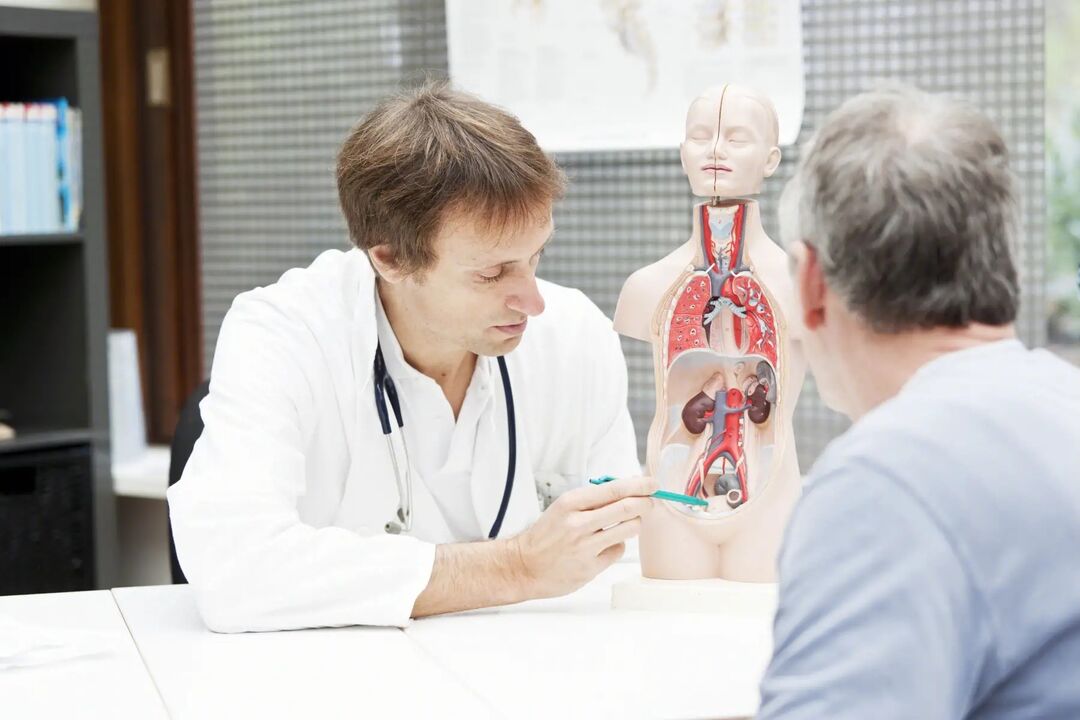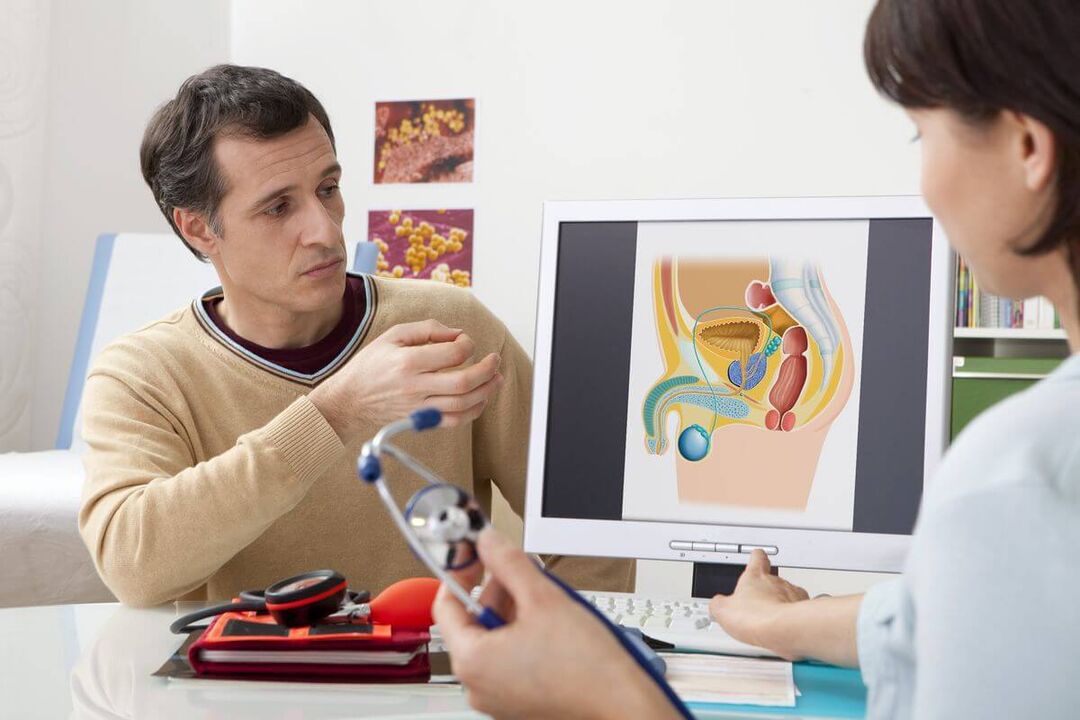Prostatitis is the most common disease of the male urogenital area. Inflammation of the prostate occurs as a result of a man's careless attitude to his health. Prostatitis causes a lot of inconvenience and can cause serious complications.

Causes of the disease
The prostate produces a secret that is responsible for the motor activity of sperm, the normalization of the pH of the urinary tract and the protection of the genitourinary system against infections.
Prostatitis most often affects men between the ages of 25 and 50. Pathology develops when an infectious agent enters the prostate tissue from the organs of the genitourinary system. Staphylococcus aureus, Enterococcus, Escherichia coli can act as infectious agents. Inflammation occurs based on the following predisposing factors:
- hypothermia;
- a sedentary lifestyle, occupation that forces a person to sit for a long time - a driver, an office worker;
- transferred urological diseases;
- sexually transmitted infections;
- violation of the normal intensity of sexual life - both excessive activity and frequent changes of sexual partners and prolonged abstinence are equally harmful;
- violation of the body's defenses - chronic stress, insomnia, malnutrition, excessive physical activity;
- reduced immunity;
- inadequate personal hygiene.
Chronic intoxications such as smoking, drinking alcohol or drugs can also increase the risk of developing prostatitis.
disease symptoms
Prostatitis can occur in an acute or chronic form. Symptoms of acute prostatitis include:
- pain in the lumbar and inguinal region of variable intensity;
- Difficulty urinating;
- burning sensation when trying to urinate;
- violation of erectile function: premature ejaculation, decreased severity of orgasm, weak erection;
- fever, chills, fever;
- disorders of the psycho-emotional state: depression, increased anxiety, decreased self-esteem.
In the absence of adequate treatment, acute prostatitis can become chronic with periodic exacerbations and remissions. The patient experiences pain of varying intensity, there may be problems in sexual life: pain during and after intercourse, decreased erection, a feeling of impotence and disappointment.
In the inflammatory process, the foci of infection spread to other organs of the genitourinary sphere of a man. The most common complications of prostatitis include:
- vesiculitis - inflammation of the seminal vesicles;
- posterior urethritis - inflammation of the seminal tubercle;
- prostate abscess - a serious bacterial disease;
- prostate cysts and stones;
- ejaculation disorders;
- infertility caused by a violation of the synthesis of prostatic secretion.
Complications of prostatitis often occur as a result of self-medication. Uncontrolled intake of antibiotics and other drugs negatively affects the intestinal microflora, reduces immunity, but does not have the desired effect on the state of the prostate gland.
Diagnosis and treatment
The disease is characterized by a specific clinical picture, so diagnosis is usually not difficult. In addition to the analysis of patient complaints, the following data is taken into account:
- rectal exam of the prostate;
- general and biochemical analyzes of urine;
- gland secretion collection;
- Prostate ultrasound;
- spermograms - to determine the risk of infertility;
- CT or MRI: to exclude the presence of benign or malignant neoplasms.

In the treatment of prostatitis, an integrated approach is used, which includes conservative therapy, the use of physiotherapy, changes in diet and lifestyle. The main role in treatment is given to drug therapy.
The main task of conservative therapy is the elimination of the inflammatory process. For this purpose, antibiotics are prescribed. The choice of drug depends on the type of bacteria that caused the pathological process. Antibacterial drugs provide a 4-6 week course of treatment.
To normalize urination, alpha1-blockers are prescribed. Preparations of this group help to relax the muscles of the gland, relieve pain and relieve swelling.
The list of drugs prescribed for exacerbation of prostatitis includes nonsteroidal anti-inflammatory drugs. Antidepressants are necessary to normalize the psychoemotional state of the patient, eliminate the symptoms of increased anxiety and depression.
Massage
Prostatic massage is one of the most effective physiotherapeutic methods for the treatment of pathologies. Finger massage is performed rectally, affecting the tissues of the prostate. During the massage, the patient should be in a side position. The massage consists of caressing and pressing movements performed with the index finger. Prostate massage is performed with a full bladder.
physiotherapy treatment
Additional treatments include the following physical therapy:
- laser therapy is a treatment method based on the use of a beam of light for therapeutic purposes;
- acupuncture - injection of medicinal substances into biologically active points of the human body;
- microwave hyperthermia - a method of treatment based on the use of energy from electromagnetic waves;
- ultrasonic impact;
- medicinal microclysters - the introduction of medicinal solutions into the rectum, they are prescribed if it is not possible to carry out physiotherapeutic procedures.
With the development of complications, such as an abscess or suppuration of the seminal vesicles, an operation is indicated.
During treatment, the patient receives recommendations on changes in lifestyle: follow the principles of a healthy diet, normalize sleep, and ensure moderate physical activity.
Prevention
Preventive measures to prevent exacerbation of prostatitis include:
- compliance with the rules of personal hygiene;
- normalization of sexual life, exclusion of casual sexual intercourse;
- exclusion of bad habits: smoking, drinking alcohol and drugs;
- ensure regular emptying of the bladder;
- the use of a large amount of fluid contributes to more frequent urination, leaching of infectious agents from the prostate;
- the use of foods with a high content of proteins and vitamins;
- sedentary work alternated with moderate physical activity;
- timely detection and treatment of infectious diseases;
- reduce daily stress level;
- increasing immunity.
The appearance of the first signs of inflammation should always be the basis for contacting a doctor. First of all, it is important to identify and treat urological and venereal diseases. Treatment of prostatitis is possible only in a medical institution. Self-treatment at home can be dangerous and cause complications.























